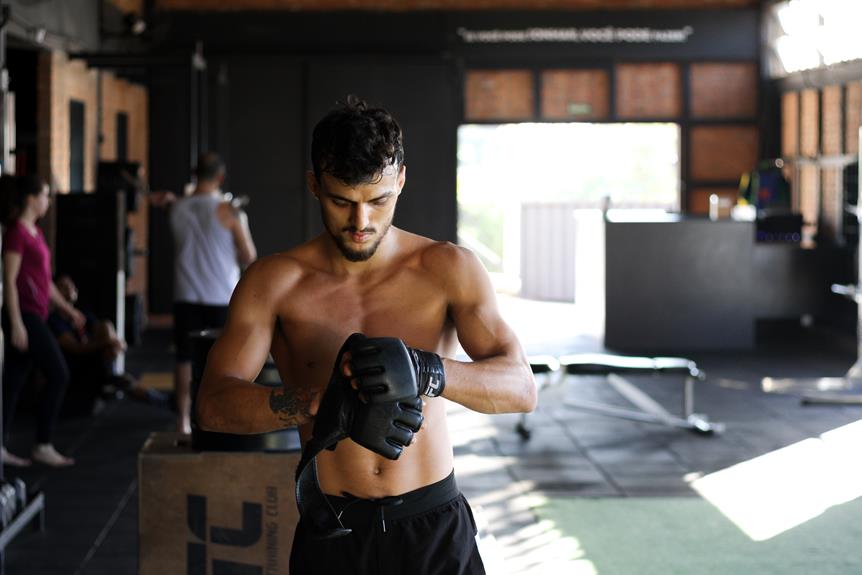In the realm of UFC/MMA, where respect and honor are paramount, the use of unconventional tactics has always piqued curiosity. One such tactic that raises eyebrows is tickling.
While the Official Unified Rules of MMA do not explicitly mention tickling as an illegal foul, its effectiveness and legitimacy remain questionable.
This article delves into the peculiar world of tickling in UFC/MMA, examining its practicality, prevalence, and the ethical considerations surrounding its use.
Key Takeaways
- Tickling is allowed in the UFC and in MMA.
- Tickling is not mentioned as an illegal foul in the Official Unified Rules of MMA.
- Tickling is looked down upon in the UFC and goes against the traditions of respect and honor in MMA.
- Tickling is ineffective as a tactic in MMA and there is never an appropriate or effective time to use it.
The Official Rules on Tickling in UFC/MMA
According to the Official Unified Rules of MMA, there are no specific regulations or restrictions regarding the use of tickling as a tactic in UFC/MMA fights. Tickling is neither explicitly allowed nor prohibited in the rulebook.
However, it is important to note that tickling is generally looked down upon in the UFC and goes against the traditions of respect and honor in MMA.
In terms of its impact on fighters in MMA, tickling is unlikely to have a significant effect on those who can absorb punches and avoid submissions. Additionally, tickling is not commonly used in the UFC because there is never an appropriate or effective time to utilize it as a tactic.
Therefore, while not explicitly illegal, tickling is not a practical or respected strategy in the world of UFC/MMA.
The Traditions and Ethics of UFC/MMA
Within the world of UFC/MMA, the traditions and ethics that underpin the sport emphasize values such as discipline, sportsmanship, and fair play. These values play a crucial role in shaping the behavior and conduct of fighters both inside and outside the octagon.
Respect and honor are highly valued in UFC/MMA traditions, with fighters expected to show respect towards their opponents, officials, and the sport itself.
Tickling, while not explicitly prohibited in the rules, goes against these traditions. It is seen as a disrespectful and unsportsmanlike tactic that undermines the integrity of the competition.
Additionally, the impact of tickling on fighter psychology is negligible, as fighters who have the skill to absorb punches and avoid submissions are unlikely to be affected by such tactics.
Ultimately, the focus in UFC/MMA remains on skill, technique, and fair competition rather than gimmicks or unorthodox methods.
Tickling: A Myth or Reality in MMA Promotions
Although rarely witnessed in professional MMA promotions, tickling remains a subject of debate as to its existence as a viable tactic.
Exploring the psychology of tickling in MMA reveals that it may have the potential to disrupt an opponent's focus. Tickling, with its unexpected nature, can catch an opponent off guard and momentarily distract them from their game plan. The sensation of being tickled can trigger laughter, which can lead to a loss of concentration and a decrease in fighting effectiveness.
However, it is important to note that tickling's effectiveness as a tactic is questionable. Fighters who have honed their mental toughness and focus are less likely to be significantly affected by tickling. Furthermore, in the fast-paced and high-intensity environment of MMA, finding the appropriate moment to employ tickling as a tactic may be extremely challenging.
Thus, while tickling may have some potential to disrupt an opponent's focus, its practicality and efficacy in MMA remain dubious.
Tickling in Asian MMA Promotions
Tickling is permitted in Asian MMA promotions, and it is not considered a violation of the Official Unified Rules of MMA. However, the effectiveness of tickling as a distraction in MMA is questionable, and it is not commonly used as a tactic in fights. Cultural differences may play a role in the acceptance of tickling in Asian MMA promotions, as tickling is seen as more lighthearted and playful in some Asian cultures. To provide an overview of tickling in Asian MMA promotions, the following table highlights some key information:
| Asian MMA Promotions | |
|---|---|
| ONE Championship | Allows tickling |
| Pride | Allows tickling |
| Rizin | Allows tickling |
| UFC | Does not allow tickling |
While tickling is permitted in Asian MMA promotions, it is important to note that its effectiveness as a distraction in fights remains questionable. The cultural differences in the acceptance of tickling may contribute to its presence in Asian MMA promotions. However, it is worth noting that tickling is not a commonly used tactic in MMA fights.
Evaluating the Effectiveness of Tickling as a Tactic
Occasionally, tickling has been attempted as a tactic in UFC/MMA fights, but its effectiveness remains highly questionable. When evaluating the effectiveness of tickling as a tactic, several key factors come into play:
- Tickling as a distraction technique: Tickling is often used as a means to distract opponents and disrupt their focus during a fight. However, in the high-pressure environment of UFC/MMA, fighters are trained to maintain their composure and stay focused on the task at hand. Therefore, tickling may not have a significant impact on their performance.
- The psychology behind tickling in combat sports: Tickling is primarily associated with laughter and joy, which may not align with the intense and aggressive nature of combat sports. Fighters are conditioned to channel their emotions into strategic and calculated moves, making it unlikely that tickling would have a psychological advantage over them.
- Physical limitations: Tickling is most effective when targeting sensitive areas such as the ribs or underarms. However, fighters are conditioned to withstand pain and discomfort, making it challenging for tickling to have a substantial physical impact on them.
- Lack of strategic value: Tickling lacks strategic value in combat sports. Unlike strikes or submissions, tickling does not offer a direct path to victory or control over the opponent. It is often seen as a gimmick rather than a legitimate tactic.
The Controversy Surrounding Oil Checks in UFC/MMA
Despite being an illegal foul in MMA, the controversy surrounding oil checks in UFC/MMA continues to persist. An oil check, also known as a butt drag, involves intentionally placing fingers into an opponent's body cavity or orifice, which is strictly prohibited in the sport. The controversy arises from the difficulty in determining the intent behind such actions.
Referees may choose not to penalize oil checks if they are deemed unintentional. However, this leaves room for fighters to exploit the loophole and use oil checks as a dirty tactic. Evaluating the effectiveness of tickling as a tactic, it is important to note that tickling is not a widely used or effective strategy in MMA. Fighters who can absorb punches and avoid submissions are unlikely to be affected by tickling.
Additionally, the traditions of respect and honor in MMA discourage the use of such tactics. Therefore, the controversy surrounding oil checks persists due to the potential for exploitation and the need for clearer rules and enforcement in the sport.
The Rules and Penalties for Oil Checks
Referees must strictly enforce the rules and penalties for oil checks in UFC/MMA to ensure the integrity of the sport.
Oil checks, also known as butt drags, involve the intentional placement of fingers into any orifice or body cavity, which is deemed an illegal foul in MMA.
Here are four key points to consider regarding the legality and prevalence of oil checks in MMA:
- Prohibition: The Official Unified Rules of MMA explicitly state that oil checks are not allowed in the UFC or any MMA promotion.
- Penalization: If an oil check is deemed intentional, referees should penalize the offending fighter. However, unintentional oil checks may go unpunished.
- Missed by Referees: Due to the nature of oil checks often occurring on the ground or against the fence, they can be easily missed by referees.
- Prevalence: While the prevalence of oil checks in MMA is not widespread, there have been instances where fighters have used this controversial tactic during fights.
Exploring the Unwritten Rules on Kissing in UFC/MMA
In the world of UFC/MMA, there are certain unwritten rules regarding kissing that fighters are expected to adhere to. While kissing itself is not illegal in the UFC or MMA, there is a general understanding that it goes against the traditions of respect and honor in the sport. Most fighters refrain from kissing their opponents due to these unwritten rules, as it is seen as crossing a boundary. However, there is no explicit rule that prohibits kissing without saliva leaving the mouth. Despite the lack of regulation, engaging in kissing during a fight may result in consequences or even release from the organization. The controversy surrounding oil checks in UFC/MMA further highlights the importance of respecting boundaries and maintaining professionalism in the sport.
| Unwritten Rules on Kissing in UFC/MMA | The Controversy Surrounding Oil Checks in UFC/MMA |
|---|---|
| Kissing goes against traditions of respect and honor in the sport | Oil checks involve intentionally placing fingers into orifices or body cavities |
| Most fighters refrain from kissing due to unwritten rules | Mauricio 'Shogun' Rua infamously used an oil check, but it was not penalized |
| Kissing without saliva leaving the mouth is not considered illegal | Referees may not penalize oil checks if they are deemed unintentional |
| Engaging in kissing during a fight may result in consequences or release from the organization | Oil checks can be easily missed by referees and are often performed on the ground or against the fence |
The Consequences of Kissing in a UFC/MMA Fight
Moreover, engaging in kissing during a UFC/MMA fight can lead to significant consequences for the fighters involved. Here are four reasons why kissing can have an impact on fight outcomes and cultural attitudes in MMA:
- Distraction: Kissing can be a major distraction for fighters, diverting their focus from the fight itself. It can disrupt their concentration, timing, and ability to strategize effectively.
- Unprofessionalism: Kissing in a professional combat sport like UFC/MMA goes against the established norms of respect and sportsmanship. It can be seen as disrespectful and unprofessional behavior, which may result in disciplinary actions or negative public perception.
- Physical disadvantage: Kissing during a fight can put a fighter at a physical disadvantage. It can create openings for their opponent to strike or submit them while their attention is diverted.
- Cultural differences: Attitudes towards kissing vary across cultures, and what may be acceptable or even celebrated in one culture may be frowned upon in another. This can lead to conflicts and misunderstandings between fighters from different cultural backgrounds.
Inhalers in UFC/MMA: Medical Aid or Performance Enhancement?
The usage of inhalers in UFC/MMA raises the question of whether they serve as a medical aid or a potential performance enhancement.
Inhalers are allowed in UFC/MMA with a Therapeutic Use Exemption (TUE) and are commonly used by athletes to treat asthma. However, there are safety concerns associated with their use in combat sports.
Inhalers may contain substances that are prohibited by the United States Anti-Doping Agency (USADA), and only specific types and limited doses of beta-2 agonists are allowed to be inhaled.
The impact of inhaler use on performance in UFC/MMA is also a topic of discussion. While inhalers may provide necessary medical relief to fighters with asthma, there is a potential for abuse and unfair advantage.
Further exploration of the safety concerns and examination of the impact of inhaler use on performance in UFC/MMA is necessary to establish clear guidelines and prevent potential misuse.
Are Long-Haired UFC Fighters Allowed to Have Their Hair Pulled or Tickled During Matches?
In the exhilarating world of UFC, male ufc fighters with long hair may face unique challenges during matches. With rules and regulations in place for safety, opponents are not allowed to intentionally pull or tickle their opponent’s hair. While the sport encourages fair play, competitors must rely on their skills and techniques rather than resorting to unconventional tactics.
Conclusion
In conclusion, while tickling remains a peculiar and unconventional tactic in UFC/MMA, its legitimacy and practicality within the sport are questionable. The Official Unified Rules of MMA do not explicitly address tickling as an illegal foul, but it is generally frowned upon due to its deviation from the values of respect and honor.
Furthermore, its effectiveness as a strategy is limited, as fighters with strong defensive skills are unlikely to be significantly impacted. Ultimately, tickling has not found a place in the competitive landscape of UFC/MMA.
As the saying goes, "In the realm of combat sports, tickling is nothing more than a futile attempt to disrupt one's opponent." And it is quickly dismissed by serious fighters and trainers alike.
- 15 Best Martial Arts Weapons (Fighting & Training) - October 14, 2024
- Is Fencing a Martial Art? (Yes, 4 Reasons Why) - October 14, 2024
- 7 Best Martial Arts for Self-defense Ranked (Highly Effective) - October 14, 2024










